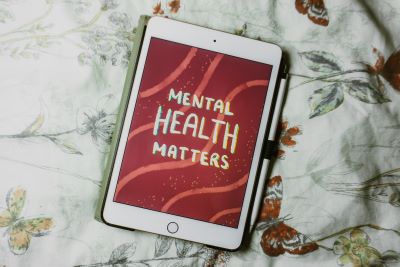Glyn Sheldon, CFG's Communications Officer, recently became a Mental Health First Aider (MHFA). Glyn spoke to his MHFA instructor, Marie Coombes, about how organisations can support employees with their mental health. Marie, who has been awarded the Diversity & Inclusion Award at the National Mediation Awards for her work on mental health and neurodiversity, also shares some advice for anyone wanting to become an MHFA themselves.

Just a couple of months after I joined CFG in July 2024, I was asked whether I wanted to undertake a course to become a Mental Health First Aider (MHFA). At CFG, wellbeing is taken very seriously, and it was an area where the organisation wanted more support.
I didn’t know much about what the course or role would entail, so I reached out to one of our previous MHFAs, Eve Trotman. Eve, who has previously appeared on the CFG podcast to talk about the importance of being mindful of our language when discussing mental health, informed me that the course, whilst challenging at times, would be hugely beneficial both personally and professionally.
I found Eve’s words to be entirely accurate. Though the course involved discussing very difficult subjects, the sessions increased my awareness of mental health issues and equipped me with new skills. The course was tailored to the work environment, and this gave me a better understanding of how important it is to be able to access mental health support in the workplace.
After successfully completing the course, I reached out to my MHFA instructor, Marie Coombes, to ask her for her thoughts on how organisations can best support their employees’ mental wellbeing, and how we can all help each other in the run up to the festive period.

MHFAs are not a ‘fix-all’
Marie explained what she felt the MHFAs role is and, more importantly, is not: “You wouldn’t expect a physical first aider in your office to perform open-heart surgery, and that’s the same with a mental health first aider”.
Marie emphasised that MHFAs are there to “catch and pass”, that is to be the ‘first responder’, to assist in the moment and signpost them to professional help or other forms of support if needed.
She explained: “MHFAs are there to provide that first-level of support for an individual, whether they be exhibiting signs of anxiety, depression or a crisis situation.”
“Going beyond this and expecting MHFAs to provide ongoing support or to act as an on-site therapist or counsellor, which MHFAs are certainly not qualified to be, would be a big mistake.”
Breaking the stigma
Marie went on to highlight that MHFAs have a big impact on their organisations outside of these specific situations where they’re required to offer direct support to individuals.
“MHFAs can play a vital role in breaking the stigma that surrounds mental health and encourage their own organisations to become more responsible, and more open to providing further support for their teams.”
One of the ways MHFAs can help to overcome the stigma is by encouraging others to be mindful about the language they use when discussing mental health conditions, at work or elsewhere. Labelling a person as “depressed” or “suicidal” should be avoided, explained Marie, adding that person-centred language such as “someone who is experiencing suicidal thoughts” may be more suitable.
She also highlighted the need for people to avoid being flippant when describing their own or others’ feelings: “OCD for example is a very serious condition, so describing yourself or someone else as ‘a bit OCD’ when referring to doing some cleaning, could potentially be viewed as dismissive.”
“At the end of the day, it’s important to just treat people as human beings.”

Supporting your staff on a budget
Charities are having to do more with less as service demands and costs rise. While many organisations care about their employees' wellbeing, a notion persists that it can be costly to take practical steps to support it. That isn't necessarily the case, says Marie.
“MHFAs and Employee Assistance Programmes are of course vital for any workplace, particularly for staff in the charity sector who may be experiencing stress, burnout or anxiety on a regular basis. But there are other things organisations can do to help their teams.”
“Organisations can encourage staff to take days off when they’re not feeling mentally well, offer flexible working arrangements that allow employees to work at times which suit them, and also having regular check-ins with their employees to foster personal connections and make talking about any problems easier”.
“Whilst some may view this as time consuming, 72 million workdays are lost to poor mental health each year, costing UK employers £45 billion. So, investing some time, and money, can be of huge benefit to your organisation.”
CFG is very proud of the wellbeing support provided for our staff. In addition to supporting employees to become MHFAs, CFG give staff two wellbeing weeks each year, offer four days of volunteering leave for staff to support other charities within the sector, and offer free access to online therapists, guided meditation and chat therapy through Plumm.

Working remotely
For remote-first organisations like CFG, supporting staff mental health and wellbeing can be even more important. Those commonplace ‘water-cooler’ moments can be infrequent or even non-existent online and Marie noted that organisations “should be really intentional about encouraging those ‘non-work’ conversations throughout the workday”.
“It could be five minutes at the start or end of a staff meeting, a ‘buddy system’ or even setting up a weekly ‘chat session’ where employees can take half an hour just to chat about their lives outside work. These can be really beneficial, and can help to overcome potential loneliness that could come from working from home.”
Marie also noted the need for organisations to provide their managers with the necessary training to discuss potentially sensitive issues around mental health with the people they manage and, for managers themselves to try to practice and develop their people skills.
“It’s all about creating an environment where people feel comfortable to talk about any problems they’re facing, be it work related or not.”
Organisations can also support their employees by signposting to resources such as Hub of Hope, a free website and app which enables users to see all available mental health services in their local area.

Supporting each other this winter
Marie acknowledged that the festive period can be a particularly difficult time for many. In the run up to the Christmas holidays, she emphasised the importance of checking in with friends, family and co-workers and providing a space to be open about how they find this time of year.
“If you’re checking if someone is okay, try to ask them twice. This shows someone you have genuine concern for their wellbeing and aren’t just asking for the sake of it. And on a personal level, if you find this period difficult, or are just struggling with your mental health at Christmas then be sure to exercise self-care and set boundaries. If that means missing Christmas dinner with the family or the work Christmas party, then so be it!”
Advice for potential MHFAs
Finally, what advice would Marie give to someone who is perhaps now considering being a mental health first aider, but may have some doubts over their competence in dealing with complex mental health conditions?
“The MHFA course is very comprehensive and provides you with extensive knowledge. MHFA England also provide you with continuous support once completing the course, you get your very own MHFA to support you and you can always ask them for advice. If you have doubts, then feel free to reach out to me”.
As a very recent MHFA myself, I can only echo Marie’s words and invite anyone who wants to be able to better understand mental health and support their co-workers, friends, family and others, to speak to Marie or another MHFA instructor to start their journey.
Mental health training resources
In addition to MHFA England, there are many charities and other organisations that also provide training on mental health in the workplace:
Mental health training with Mind
Samaritans training and engagement programmes
British Red Cross mental health at work courses
For further information or advice on becoming a Mental Health First Aider, please feel free to reach out to Marie at marie.coombes@werestorecalm.com
And if you have any further advice or ideas on how to support staff wellbeing, please feel free to get in touch at glyn.sheldon@cfg.org.uk